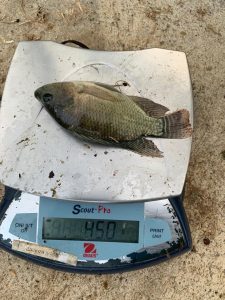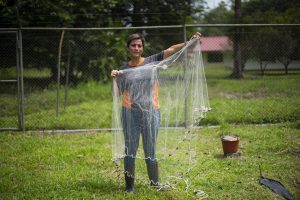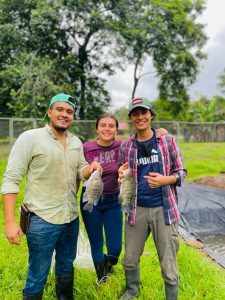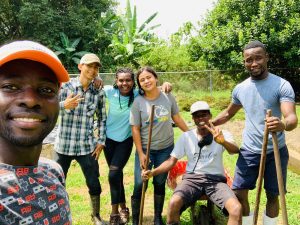Aquaculture Production: A solution to global problems
At 6:00 a.m. on a Wednesday, the entire Guácimo Campus begins to fill with students with their bicycles. They disperse throughout the six Work Experience modules, where first and second-year students put their knowledge into practice. Fourth-year students engage in their Professional Experience, where they lead each of the modules, teach their colleagues from other classes the knowledge acquired over time and also propose projects with the faculty in different areas. On Wednesdays, everyone is in the field learning about a myriad of topics through life experience, one of the factors that make our Academic Program unique in the world.
Community, Livestock Farm, Integrated Organic Farm, Academic Agricultural Services Practices, Forestry Farm, and Crops Farm are the six modules through which the students develop their training as leaders able to seek solutions to global problems. Within the Livestock Farm, the Aquaculture Production project stands out. It is led by Professor Diana Ávila and Student Arnold Katende (Class of 2021, Uganda), with a scholarship from the Mastercard Foundation.
Aquaculture involves the controlled breeding, cultivation, and harvesting of aquatic organisms, such as mollusks, fish, and algae. According to the Food and Agriculture Organization of the United Nations (FAO), capture fishing has declined in the last 30 years, implying a possible future growth for the fisheries sector in aquaculture production. At EARTH, this process produces tilapia, a fast-growing species that adapts to artificial feed, tolerates high densities, and is easy to manage. It is also a food full of nutrients essential for human health.
“At the aquaculture station, we teach students how to produce tilapia. We focus on understanding the planting process, which is when we place the fry, then the growth process, the care that a pond should have, the life cycle, and the fattening of the fish. Later, we teach what is called the harvest, which is when we remove the fish from the pond through artisanal fishing,” says Professor Diana, who has been working hard on this project for almost two years.
Together with the Academic Unit, she has established concrete objectives for the station that gradually have begun to materialize. The student body learns about aquaculture as a solution to tackle climate change, food insecurity, and industrial fisheries’ exploitation of the oceans and seas. This knowledge also intertwines with the environmental commitment and good agricultural practices that EARTH implements throughout the Academic Program.
Since his second year, Arnold has been working on his Joint Organic Aquaponics project. He is developing a demonstration center to provide training and workshops on aquaponics in Uganda.
“My project is directly related to aquaculture production because it involves aquaculture to produce fish and hydroponics to produce plants and vegetables. The Professional Experience I received has prepared me to work even better at Joint Organic Aquaponics. I have learned to work with people, in this case, students, to share my knowledge assertively,” says Arnold, whose goal is to seek food security and sovereignty for Ugandans through this type of production.
Both Ávila and Professor Rafael Marzall, Work Experience Coordinator, mention that these types of spaces allow comprehensive learning in which both teachers and students are filled with new knowledge every day. Leaders are empowered and prepared to go out into the world, students from other class levels investigate their principal agronomic interests through practice, and the faculty generates more spaces for research and project development.
We hope that, like Arnold, more students will apply this kind of practice in their countries to make the world a better place.









